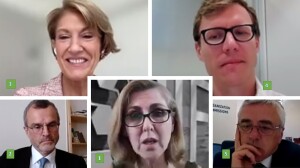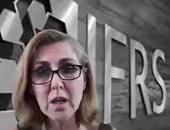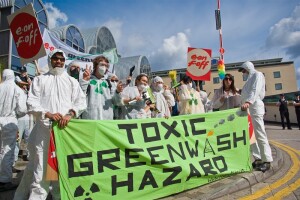Investors around the world are demanding consistent, high-quality reporting of environmental, social, and governance (ESG) data. Is there any global governing body for financial reporting that is up to the task? How can an organization ensure that sustainability reporting is comparable, consistent, and comprehensive? Furthermore, is the input from financial professionals welcomed?
The answer, apparently, is “yes” on all three counts. On June 21, 2022, Josina Kamerling, member of the Value Reporting Foundation and the CFA Institute, welcomed an audience of hundreds to a webinar titled “Endgame: Will the ISSB become the comprehensive global baseline for sustainability disclosure?” She introduced the representative of the standards committee.
Sue Lloyd, Vice-Chair of the International Sustainability Standards Board (ISSB), presented the history and objectives of the ISSB. She said that at COP 26 (the 26th United Nations Climate Change conference held November 2021 in Glasgow, Scotland), “We had overwhelming response that supported the creation of ISSB as a sister board to the International Financial Reporting Standards IFRS.”
“We want to establish a global baseline for sustainability to understand the value of a company and its shares,” Lloyd said. “We want to streamline and improve the efficiency of reporting.”
“We know that jurisdictions have particular needs beyond those of the investors. We seek to achieve compatibility between IFRS accounting standards and the IFRS sustainable disclosure standards.” The ISSB wants to take into account the Task Force on Climate Related Financial Disclosures (TCFD) recommendations and the Sustainability Accounting Standards Board (SASB) standards, to achieve an integrated reporting framework.
Currently, two documents are out for feedback: the general requirements exposure draft, and the climate exposure draft. The latter spells out requirements for disclosure of “material information about significant climate-related risks and opportunities.”
Key features include transition planning, climate resilience for multiple scenarios, and scope 1-2-3 emissions for greenhouse gases.

1. Sue Lloyd, Vice-Chair, International Sustainability Standards Board (ISSB)
2. Thierry Philipponnat, Chief Economist, Finance Watch and Member of the EU Platform on Sustainable Finance
3. Alicia Rubi, CFA, Partner at Attalea Partners
4. Nicolai Lundy, Chief of Market Relationships, Value Reporting Foundation
5. Martin Moloney, Secretary-general, International Organization of Securities Commissions (IOSCO)
From now until July 29, 2022, the ISSB is seeking feedback on these two proposed standards, with the goal of issuing new standards by the end of 2022, subject to the feedback.
Lloyd said other technical priorities include digital taxonomy, SASB standards, and a work plan to decide what to focus on next.
Following Lloyd’s summary of the ISSB, a moderator and three panellists discussed issues related to sustainability standards. The moderator was Alicia Rubi, CFA, Partner at Attalea Partners, an environmental, social, and corporate governance (ESG) strategic and financial consultancy in Madrid. She first asked the panellists what is being done to prevent “greenwashing,” the practice of providing false or misleading information about how a company’s products are more environmentally friendly than what they truly are.
“We are seeing some significant enforcement action from the SEC,” said Martin Moloney, Secretary-General of International Organization of Securities Commissions (IOSCO). He pointed to the recent fines levied against BNY Mellon for their greenwashing. “We not only need regulators but also we need the industry to attach a degree of opprobrium to such behaviour.” He said the banking industry must minimize greenwashing within 3 to 4 years.
The question is first whether “market participants—issuers and financial companies—are they doing what they say they are doing?” said Thierry Philipponat, Chief Economist, Finance Watch and Member of the EU Platform on Sustainable Finance. The information must be clear and accurate. “Then we ask, whether what is being done actually has an impact.”
“What we are really talking about is: are you accurate and intense about sustainability,” said Nikolai Lundy, Chief of Market Relationships, Value Reporting Foundation. He said he has “enthusiasm for clarity, because that creates more credibility.” He emphasized that “companies want clear guidance on what is expected.” As always, Lundy cautioned, “the devil is in the details.”
Alphabet soup
Rubi asked the panellists if they thought the “alphabet soup” of standards and certifications was getting better.
“Yes, the alphabet soup is ending,” Lundy said, because SASB will go to the IFRS. “They are coming together for greater benefit.” The G7 welcomed this, and he urged the audience to “use their influence by the July 29 deadline to make the global baseline a reality…. We see ISSB as the best way to make it happen.”
Lundy also encouraged the audience to take up the accreditation offered by the ISSB. “We need people in the market who can understand it, apply it, and use it.”
Moloney agreed that alphabet soup exists. “Every day it seems I come across a new group in the marketplace, and now, the public sector is taking up the initiative.” He pointed out that individuals such as Mark Carney are creating alliances between different groups.
“We don’t need an entirely neat outcome,” Moloney said, “it just needs to do the job: feed into the industry, training, and development. The key thing is to have industry on board.”
Fiduciary vs sustainable
“Does the definition of fiduciary duty involve your impact on the world?” asked Philipponnat. Sustainability means you should consider the effect of your investment on the world. “We don’t have the same notion [about who the stakeholders are] on both sides of the Atlantic.”
It’s the European vs American clash, and “we will need good will on each side to resolve.”
“Regarding fiduciary duty,” Lloyd said, “we’ve seen a sea change in attitude over the past few years” as the environment worsens. “It’s not just future cash flow, but also the cost of capital.” She urged the adoption of the approach described as a “baseline with building block” add-ons that the ISSB is promoting.
There will be stranded assets, Philipponnat warned. “There is no scenario for fossil fuels in the future. The value of such assets will decrease.”
Despite political uncertainty, progress is being made, the panellists agreed. For example, in the case of carbon offsets, Moloney said, “financial markets have moved ahead of governments. GFANZ will soon come out with guidance on carbon credits.” He was referring to the Glasgow Financial Alliance for Net Zero, a global coalition of leading financial institutions committed to accelerating the decarbonization of the economy. ♠️
DEADLINE: July 29, 2022, the ISSB is seeking feedback on the proposed standards.




